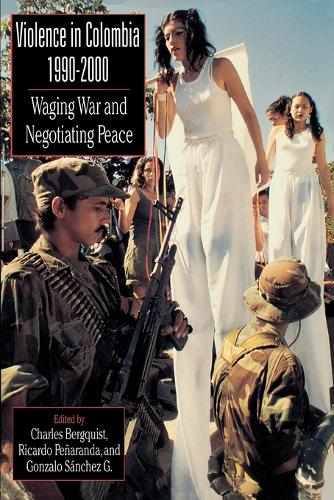
Violence in Colombia, 1990-2000: Waging War and Negotiating Peace
(Paperback)
Publishing Details
Violence in Colombia, 1990-2000: Waging War and Negotiating Peace
By (Author) Charles Bergquist
Edited by Ricardo Pearanda
Edited by Gonzalo Snchez
Bloomsbury Publishing PLC
Rowman & Littlefield Publishers
1st March 2001
United States
Classifications
General
Non Fiction
Violence and abuse in society
International relations
303.609861
Physical Properties
Paperback
288
Width 159mm, Height 229mm, Spine 21mm
535g
Description
Violence In Colombia provides students with a deeper understanding of the crisis facing Colombia today. The book focuses on the 1990s, a decade that witnessed a strengthening of the oldest and largest guerrilla insurgency in the Americas and the emergence of a powerful paramilitary right. The decade also saw a dramatic rise in homicide, kidnapping, and human rights violations that made Colombia by far the most violent nation in the hemisphere. But the 1990s was also about negotiating peace. The decade began with negotiations between the government and some of the guerrilla groups that led to their demobilization and to the important reforms codified in the Constitution of 1991. It ended with another serious attempt at negotiating peace, a historic agreement between the government and the largest and most powerful of the guerrilla groups to put a range of social and economic reforms on the negotiating table. For many, the crisis in Colombia is understood in terms of the drug trade. To be sure, the drug trade is implicated in every aspect of the crisis. And despite (or because of) escalating efforts by the Colombian and U.S. governments to curb the trade, Colombia's role as the leading supplier of cocaine, and increasingly of heroin, to the U. S. market continues to expand. But the drug trade, by itself, cannot explain the crisis. If it could, why have other Latin American drug-producing and trafficking nations not experienced a fate like Colombia's To answer this question, the book presents some of the best recent work by Colombian scholars on the crisis facing the nation. Violence in Colombia also includes a large section devoted to primary documents, which enables students to get a feel for the views of the protagonists in the conflict and judge for themselves the meaning of what they say. Examples include the negotiating positions of the government, the guerrillas, and the paramilitary right; testimony by kidnap victims and human rights lawyers; and assessments by U.S. officials and Colombian commentators of the war on drugs. Introductions to each of the essays and documents place this material, umost of it made available to English readers for the first time,/u in broad analytical and historical context. This is an excellent text for Latin American history courses and courses on political violence.
Reviews
Accompanied by key documents on the current cycle of violence and revealing chapters by knowledgeable collaborators on drug trafficking and the national economy, violations of human rights, war, violence and gender, and social movements, this book is a benchmark in the literature on Colombian politics. Ideal for the classroom. -- Brian Loveman, San Diego State University
From the dark labyrinth of Colombia come these ten remarkable essayseach a rare combination of professional objectivity and political engagementto explain a nation in the 1990s that has been at war with itself for a half century. The complex interplay of today's actors, the State, the guerrillas, the paramilitaries, the drug traffickers, civil society, women and men who are the victims and the survivors of these wars, and now increasingly the U.S. government, is dramatically revealed in these pages. -- Herbert Tico Braun, University of Virginia
Authored by the most insightful Colombian intellectuals, this is an important, timely book that is essential to understanding the current crisis in Colombia and possible solutions. -- Catherine LeGrand, McGill University
The editors of this work are to be commended for crafting an important book that synthesizes the extant literature showing the historical continuities that line Colombia's violent past with the present. * Revista Iberoamericana *
